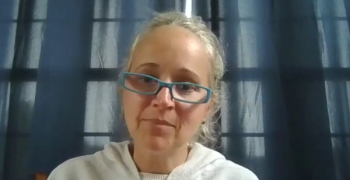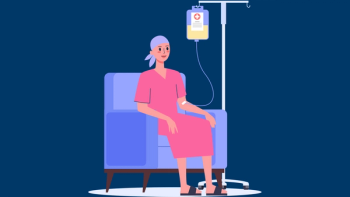
Neoadjuvant durvalumab plus chemotherapy, followed by adjuvant durvalumab, received approval from the FDA for select patients with resectable non–small cell lung cancer.

Neoadjuvant durvalumab plus chemotherapy, followed by adjuvant durvalumab, received approval from the FDA for select patients with resectable non–small cell lung cancer.

Compared with chemotherapy, enfortumab vedotin plus pembrolizumab improved survival with no detriment to QOL in previously untreated metastatic urothelial cancer.

An expert explained how oncology nurses and APPs should stay informed on the latest genetic mutations that targeted therapies focus in on for non-small cell lung cancer.

The FDA approved axatilimab for adults and children with chronic graft-vs-host disease whose disease progressed after 2 or more lines of systemic therapy.

A research statement was released by ASCO that highlights 4 recommendations to improve access to clinical trials by patients with cancer.

To improve the well-being of these caregivers and their patients with cancer, oncology nurses and APPs should prioritize cultural competence, language support, and accessible resources.

SON-080, a novel drug, may reduce chemotherapy-induced peripheral neuropathy in patients previously treated with chemotherapy.

Adding IMNN-001 to perioperative chemotherapy enhanced overall survival in patients with newly diagnosed, advanced ovarian cancer.

Olanzapine improved control of nausea and vomiting from moderately emetogenic chemotherapy, which may suggest its use as a standard of care for antiemetic prophylaxis.

Treatment with pembrolizumab and chemotherapy for head and neck squamous cell carcinoma provided responses with a manageable safety profile.

The biologics license application that was resubmitted for remestemcel-L has been accepted by the FDA for the potential treatment of children with steroid-refractory acute graft-vs-host-disease.

An expert discusses recent advancements in breast cancer treatment, focusing on the addition of CDK4/6 inhibitors for high-risk ER-positive, HER2-negative breast cancer.

Adding blinatumomab to consolidation chemotherapy provided a significant OS benefit in MRD-negative B-cell precursor acute lymphoblastic leukemia.

Ozuriftamab vedotin, an ROR2-targeted antibody drug conjugate, received fast track designation from the FDA for recurrent or metastatic head and neck squamous cell carcinoma.

Weighted blankets alleviated anxiety for patients with cancer undergoing infusions without interfering with their care.

Denileukin diftitox received FDA approval to treat relapsed/refractory cutaneous T-cell lymphoma previously treated with at least 1 systemic therapy.

NCCN guidelines have been updated to recommend imetelstat to treat symptomatic anemia in patients with lower-risk myelodysplastic syndromes.

Fast track designation has been granted from the FDA to HP518 to treat androgen receptor–positive triple-negative breast cancer.

This marks the first approval of a systemic therapy for patients with grade 2 astrocytoma or oligodendroglioma with an IDH1 or IDH2 mutation.

Atezolizumab was safe and effective when administered before and following chemoradiation in unresectable stage III non–small cell lung cancer.

Nivolumab plus tivozanib did not improve progression-free survival in patients with advanced metastatic renal cell carcinoma after prior immune checkpoint inhibition.

Men with metastatic hormone-sensitive prostate cancer treated with darolutamide plus ADT in the phase 3 ARANOTE trial had improved radiologic progression-free survival compared with placebo.

Pregnancies may be carried out and were successful in patients after undergoing allogeneic hematopoietic cell transplantation.

Treatment with paxalisib in patients with newly diagnosed unmethylated glioblastoma was well tolerated with no new safety signals.

Fast track designation has been awarded by the FDA to the next-generation precision radiopharmaceutical therapy ABD-147 to treat extensive-stage small cell lung cancer.

Crofelemer missed the diarrhea endpoint in a study assessing prophylaxis in adult patients with solid tumors receiving targeted therapy.

Accelerated approval has been granted by the FDA to afamitresgene autoleucel for certain patients with pretreated unresectable or metastatic synovial sarcoma.

A dostarlimab-gxly combination was approved for advanced or recurrent endometrial cancer.

Donna Catamero, ANP-BC, OCN, CCRC, discusses the importance of quickly identifying and managing adverse effects from CAR T-cell therapy in patients with multiple myeloma.

Developing a strong working relationships and understanding the physical and emotional demands of the oncology specialty are some ways nurses can address burnout, an expert said.